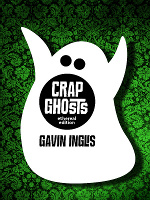Blog
Standup
16th March 2011
Ten minutes where I learn whether I am funny.So I had a secret plan to try stand-up comedy in 2011. I feel comfortable MCing and lots of my stories are funny, so I thought it would be a natural progression. I thought I'd book into a beginners’ night and while I was waiting for my name to come up — these things have an eight-month queue — I would embark on a period of intense study to try, somehow, to assemble five minutes of usable material. That was before Siân Bevan offered me a ten-minute slot at her comedy storytelling night Electric Tales with two weeks notice.
I could have easily done a couple of stories from Crap Ghosts but there is a “no reading” rule. So it came down to memorising stories — which I should do anyway — or trying something new.
I’ve learned flash fiction word-for-word before, for a “prose slam”. I found I could do it but my performance lacked energy. I was so busy concentrating on getting the words right that I wasn’t throwing myself into it like I usually would. So I put the substandard spooks away for the night and worked up some material on The Six Million Dollar Man.
![[Bionic Punch]](http://farm6.static.flickr.com/5060/5531631532_7719f15aa7.jpg)
Nobody is quite sure what to make of Electric Tales. The storytellers like Gerry Durkin select their funnier stories. The comedians like Andrew Learmonth discard some nob gags and make room for something with more narrative. Coming at it from the storytelling angle is easier because it’s driven by a series of images: you talk about the bionic legs, then arms, then eye, then ear. You don’t need to remember the exact words. I practised while walking around the city. Mothers ushered their children away as I mimed the “bionic leap”. Where the links were not obvious I found a cognitive chain: helicopter drone leads to talking about the “pilot” episode, and so on. I was slightly staggered and utterly pleased to get through the entire ten minutes on the night without missing a link. It felt like about three minutes actually.
What stays with me is the backstage atmosphere. A comedy club backstage is an intense place. Everybody is relaxed and friendly on the tigerprint armchairs, but there’s a constant awareness of the audience, just through the wall. Everybody (except Siân) is out of their comfort zone; even a consistently brilliant performer like Alan Bissett wasn’t sure that The Stand comedy club was the right place for his Moira Monologues. There is no telling until you get out there. And before you get out, there’s a protracted period of standing just behind the stage door, just out of sight, waiting, waiting.
The night belonged to Susan Calman though. She put aside the guaranteed laughs to tell the story of her personal journey through Glasgow’s lesbian subculture and eventual coming out to her parents. It was fascinating — I had no idea mass punch-ups happened so regularly at women-only clubs — and moving, and of course, bloody funny, as ordinary life is. She posted the next day that she didn’t know whether it had been the worst or the best gig of her life. Part of the backstage talk had been about conventional stand-up and how aggressive it has become, as opposed to the storytelling. I really hope Susan decides to give us more of this stuff. Although a part of me wants it to have been a one-night thing, just for those of us who were there.
![[Susan Calman]](http://farm6.static.flickr.com/5219/5531080261_43faa949e2.jpg)
There was also a girl who very much wanted to win a luminous robot. But that is another story.
